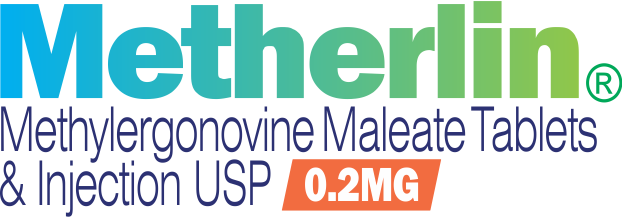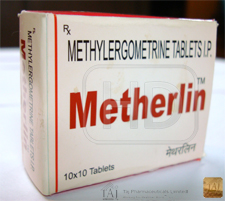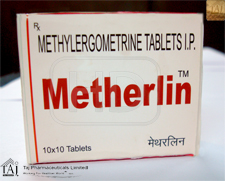|
|
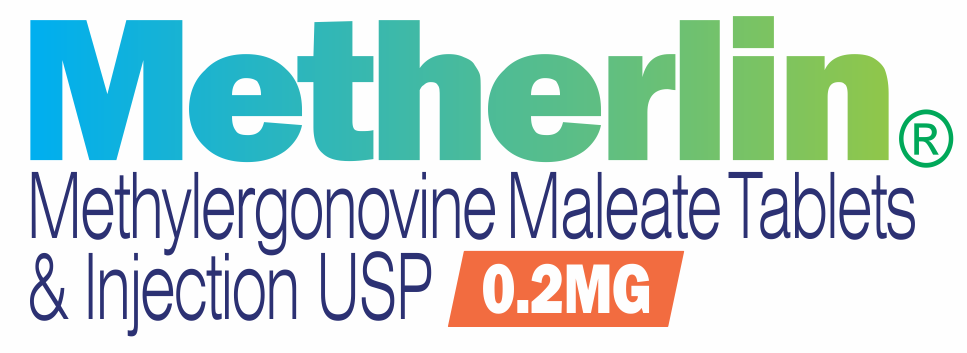
INDICATIONS
METHERLIN® (METHYLERGONOVINE MALEATE) IS INDICATED FOR
ROUTINE MANAGEMENT OF UTERINE ATONY, HEMORRHAGE AND
SUBINVOLUTION OF THE UTERUS FOLLOWING DELIVERY OF PLACENTA AND
FOR CONTROL OF UTERINE HEMORRHAGE IN THE SECOND STAGE OF LABOR
FOLLOWING DELIVERY OF THE ANTERIOR SHOULDER.
IMPORTANT SAFETY INFORMATION
Metherlin Tablets are contraindicated for patients with the
following conditions: hypertension, toxemia, pregnancy, and
hypersensitivity.
WARNINGS
General: This drug should not be administered I.V. routinely
because of the possibility of inducing sudden hypertensive and
cerebrovascular accidents. If I.V. administration is considered
essential as a lifesaving measure, Metherlin (methylergonovine
maleate) should be given slowly over a period of no less than 60
seconds with careful monitoring of blood pressure.
Intra-arterial or periarterial injection should be strictly
avoided. Caution should be exercised in presence of impaired
hepatic or renal function.
Breast-feeding: Mothers should not breast-feed during treatment
with Metherlin. Milk secreted during this period should be
discarded. Metherlin may produce adverse effects in the
breast-feeding infant. Metherlin may also reduce the yield of
breast milk. Mothers should wait at least 12 hours after
administration of the last dose of Metherlin before initiating
or resuming breast feeding.
Coronary artery disease: Patients with coronary artery disease
or risk factors for coronary artery disease (e.g., smoking,
obesity, diabetes, high cholesterol) may be more susceptible to
developing myocardial ischemia and infarction associated with
methylergonovine-induced vasospasm.
Medication errors: Inadvertent administration of Metherlin to
newborn infants has been reported. In these cases of inadvertent
neonatal exposure, symptoms such as respiratory depression,
convulsions, cyanosis and oliguria have been reported. Usual
treatment is symptomatic. However, in severe cases, respiratory
and cardiovascular support is required. Metherlin has been
administered instead of vitamin K and Hepatitis B vaccine,
medications which are routinely administered to the newborn. Due
to the potential for accidental neonatal exposure, Metherlin
injection should be stored separately from medications intended
for neonatal administration.
PRECAUTIONS
General: Caution should be exercised in the presence of sepsis,
obliterative vascular disease. Also use with caution during the
second stage of labor. The necessity for manual removal of a
retained placenta should occur only rarely with proper technique
and adequate allowance of time for its spontaneous separation.
Drug Interactions: There have been rare reports of serious
adverse events in connection with the coadministration of
certain ergot alkaloid drugs (e.g., dihydroergotamine and
ergotamine) and potent CYP 3A4 inhibitors, resulting in
vasospasm leading to cerebral ischemia and/or ischemia of the
extremities.
Caution should be exercised when Metherlin® Tablets are used
concurrently with beta-blockers. Concomitant administration with
beta-blockers may enhance the vasoconstrictive action of ergot
alkaloids.
ADVERSE REACTIONS
The most common adverse reaction is hypertension associated in
several cases with seizure and/or headache. Hypotension and
anaphylaxis has also been reported. Cerebrovascular accident,
paraesthesia, ventricular fibrillation, ventricular tachycardia,
angina pectoris, atrioventricular block were also reported
post-marketing.
Safety and effectiveness in pediatric patients have not been
established.
DRUG DESCRIPTION
Metherlin (methylergonovine maleate) is a semi-synthetic ergot
alkaloid used for the prevention and control of postpartum
hemorrhage.
Active Ingredient: methylergonovine maleate, USP, 0.2 mg.
Inactive Ingredients: acacia, carnauba wax, D&C Red #7, FD&C Blue
#1, gelatin special, lactose, maleic acid, mixed parabens,
povidone, sodium benzoate, sodium hydroxide, starch, stearic acid,
sucrose, talc, and titanium dioxide.
INDICATIONS
For routine management after delivery of the placenta; postpartum
atony and hemorrhage; subinvolution. Under full obstetric
supervision, it may be given in the second stage of labor
following delivery of the anterior shoulder.
USES
This medication is used to help stop bleeding after delivery
of the placenta in childbirth. Methylergonovine maleate belongs to
a class of drugs known as ergot alkaloids. It works by increasing
the stiffness of the uterus muscles after the last stage of labor.
This effect decreases bleeding.
DOSAGE AND ADMINISTRATION
Intramuscularly
0.2 mg, after delivery of the anterior shoulder, after delivery of
the placenta, or during the puerperium. May be repeated as
required, at intervals of 2-4 hours.
Intravenously
Dosage same as intramuscular.
Orally
One tablet, 0.2 mg, 3 or 4 times daily in the puerperium for a
maximum of 1 week.
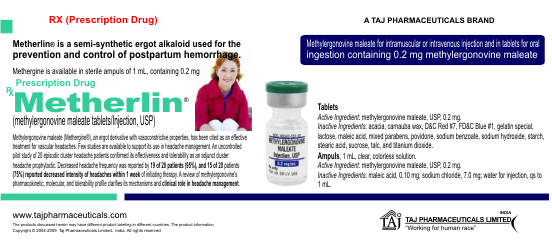
SIDE EFFECTS
The most common adverse reaction is hypertension associated in
several cases with seizure and/or headache. Hypotension has also
been reported. Nausea and vomiting have occurred occasionally.
Rarely observed reactions have included: acute myocardial
infarction, transient chest pains, arterial spasm (coronary and
peripheral), bradycardia, tachycardia, dyspnea, hematuria,
thrombophlebitis, water intoxication, hallucinations, leg cramps,
dizziness, tinnitus, nasal congestion, diarrhea, diaphoresis,
palpitation, rash, and foul taste.1
There have been rare isolated reports of anaphylaxis, without a
proven causal relationship to the drug product.
Drug Abuse And Dependence
Metherlin (methylergonovine maleate) has not been associated with
drug abuse or dependence of either a physical or psychological
nature.
WARNINGS
This drug should not be administered I.V. routinely because of the
possibility of inducing sudden hypertensive and cerebrovascular
accidents. If I.V. administration is considered essential as a
lifesaving measure, Metherlin (methylergonovine maleate) should be
given slowly over a period of no less than 60 seconds with careful
monitoring of blood pressure. Intra-arterial or periarterial
injection should be strictly avoided.
PRECAUTIONS
Before taking methylergonovine maleate, tell your doctor or
pharmacist if you are allergic to it; or to similar ergot
alkaloids (e.g., ergonovine); or if you have any other allergies.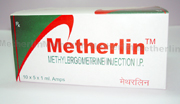
This medication should not be used if you have certain medical
conditions. Before using this medicine, consult your doctor or
pharmacist if you have: high blood pressure, a certain
complication of pregnancy (toxemia).
Before using this medication, tell your doctor or pharmacist your
medical history, especially of: heart disease (e.g., venoatrial
shunt, mitral valve stenosis), other complications during
pregnancy (e.g., pre-eclampsia, eclampsia), a serious blood
infection (sepsis), blood vessel problems (e.g., Raynaud's
phenomenon, obliterative vascular disease), kidney problems, liver
problems.
This drug may make you dizzy or drowsy. Use caution while driving,
using machinery, or doing any activity that requires alertness.
Limit or avoid alcoholic beverages.
STORAGE
Store at room temperature below 77 degrees F (25 degrees C) away
from light and moisture. Do not store in the bathroom. Keep all
medicines away from children |
|







